Interview with Dr. Yamane Part 1: Improving Education and Work-Life Balance in Healthcare
|
As the second installment of KOTOBUKI Medical’s interview project, we interviewed Dr. Yusuke Yamane, head of the pediatric surgery team at Nagasaki University. We had the chance to talk about his efforts in surgical education, including his online “Yamane Juku” program, as well as his daily endeavors as a doctor and a father. This interview is quite long, so we’ve split it into two parts for ease of access and readability.
|
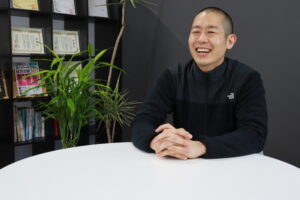
Thank you for taking the time to talk with us! To start us off, would you mind talking about your current efforts? This can be in your personal life or in the medical profession.
To put it bluntly, my current efforts are to create an environment in which junior surgeons can work with more ease and comfort.
Currently, there’s a shortage of people…not only in pediatric surgery but in general surgery. That shortage is continuing to grow. I would like to help boost surgery as a whole by improving surgical education.
However, I have a dilemma.
I want to engage in active recruitment for more surgeons, but it’s hard to keep this goal on the sidelines when I’m teaching. If I keep focusing too much on recruitment, my educational content will be tainted with the desire to “get people to join surgical departments.”
I want people to join the profession, but I don’t want to provide surgical education in order to get people to join the profession. Rather, I want to communicate the goodness and essence of surgery so that more people will want to join a surgical department as a result.
That is the stance I would like to take.
On the other hand, if I focus on only surgical education content, the medical office may look at me and say, “Oh, you can use that as material for recruiting activities” (laughs).
That is a bit of a problem for me.
In terms of my personal efforts, I’m working hard at improving my health.
I have stopped drinking alcohol.
The thing is, I made quite a few mistakes with alcohol in the past… (laughs) I’ve been sober for three years now. In addition to sobriety, I’m running to work as my commute.
There’s only about one kilometer between my home and the hospital. I’m not good at maintaining the habit of going to the gym regularly, so I try to do my own training as much as possible.
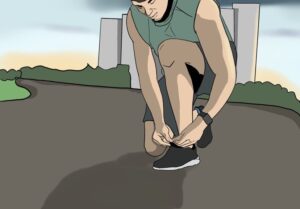
Congratulations. Do you find that the mentality of maintaining good health and self-discipline comes alive in your education?
Probably not. (laughs)
Actually, I’m very careful at Yamane Cram School to keep things from becoming like a sports club.
For med students, surgeons tend to have a scary reputation. The students can be pretty nervous when they first join. Fortunately, I’ve received feedback that they end up feeling relaxed.
I want to lower the barriers as much as possible to get people interested in surgery.
In terms of physical self-discipline, I actually make it a routine not only to do muscle training but also to do housework in the morning.
I wake up in the morning, improve my environment by doing housework, then improve myself with training.
|
Dr. Yamane’s Morning Schedule 5:30 Wake up Take the dishes out of the dish washer Make rice and miso soup Take some amino acids and stretch Do strength training, drink a protein shake 6:30 Wake up the kids and spend some time with them 6:40 Jog to work 7:00 Cool off by practicing laparoscopic origami cranes 7:10 Practice ligatures using the Omni-Trainer 7:30 Morning group rounds
|
That’s impressive. So, about Yamane Cram School. About three years have passed since you started creating this educational program online. Have you seen any big changes?
Maybe not any big changes.
The number of students has consistently averaged between three and five, or at the most ten students, since the beginning of the program. Not all of the students have gone on to become surgeons, either.
However, when we first started, it was only Nagasaki University students, but now we are receiving more direct inquiries via DM, etc., thanks in part to our efforts on social media websites like YouTube and Twitter.
We’ve also seen many students who aren’t enrolled at Nagasaki University join since then.
Currently, we have a total of five sitting students, with a total of 50 students who have already graduated.
That’s exciting. We look forward to hearing more good news. Have you been posting content from Yamane Cram School on YouTube and Twitter?
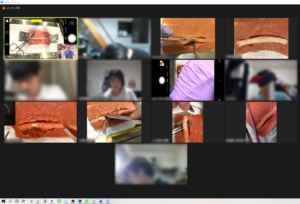
The live online Yamane Cram School is held every Wednesday at 9:00 p.m., but there are quite a few people who can’t come due to part-time jobs or other reasons.
Yamane Cram School does provide an archive of that day’s session for limited viewing at a later date, and those who couldn’t attend are able to practice on their own while watching the streamed video.
Since visual information is extremely important in surgery, I intentionally turn off the sound so that the viewer can concentrate on the visual information.
Also, when I record procedural content, I try to include common error points and techniques that are considered difficult.
Thanks to your support, I now have 2,100 subscribers to my channel.
In your opinion, what are the current challenges of medical education?
There are many challenges, but perhaps the most important is that few people can afford to spend their own money when honing their skills.
Medical training is quite expensive. First, you need to invest in consumable items such as thread needles, forceps, needle holders, dry boxes, etc. But what do you practice on once you have the tools?
Professional suturing kits can be costly for med students.
As a theme for creating technique videos at Yamane Cram School, we try to work around the challenge of costly training models by training with DIY methods using familiar items such as 100 Yen Shop products.
With the topic of challenges to medical education in mind, what do you focus on in your own teaching efforts?
First of all, I keep a firm boundary between my recruiting efforts and my teaching efforts. I also do my best not to “overteach”, if that makes sense.
My goal is to create a “chill with no frills” kind of atmosphere at the Yamane Cram School. For example, I’ll teach a group of students while making food for my youngest son or even when helping him with his homework.
Having my kids around is important because I also want to normalize the idea that doctors…especially fathers…can pursue teaching or learning while spending time with their kids at home.
This goes beyond my online teaching. If I still have work to do, I’ll let my sons wait in the doctor’s office at the university after picking them up from school.
A decade ago, I am sure there would have been an atmosphere of “you can’t take your child to work with you,” but nowadays that is not the case, and I want to actively show the younger generation that they can balance their family life and work life, maybe even introducing the two.
Now that you mention it, we saw you helping your son brush his teeth in one of the videos. You were great at teaching your students and your son at the same time.
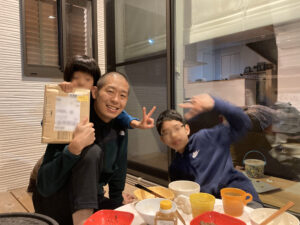
So, in addition to being dedicated to your profession, you’re also committed to your role as a father. What are some things you do to achieve a good work-life balance? Do you have any advice for doctors who recently became parents?
I have so much to say about this topic. (laughs)
First, despite your impression that I have a good work-life balanceI actually had no home life at all until recently.
My first son was born in 2011, and he was two years older in the blink of an eye. I was 31 or 32 years old myself at the time.
So is it true what they say, that your 30s are prime for career growth as a surgeon?
At that time, I was expected to be at the top of my game and going full speed.
I participated in about 1,000 surgeries in two years, including 500 primary surgeries.
The amount of leeway I have now in my life is in part due to the fact that I concentrated so completely on performing surgeries at that time. Unfortunately, this came at the cost of regard for my family. I wasn’t in a situation in which I could talk about work-life balance.
It was not until around 2021 that I was able to achieve the balance between work and home that I have now. The major trigger for this change was the decision to buy a house during the pandemic and the hospitalization of my second son.
When the pandemic hit, I found it difficult to get support from the people in my immediate circle, and my parents’ home was far away. I realized that the health of my wife and family needed to be the most important thing in the Yamane household.
I’m physically stronger than my wife and have a lot of stamina, so I wanted to do as much as possible around the house to help her. I started simply: by taking charge of breakfast on Saturdays and Sundays.
Then about a year after that, my second son was hospitalized with a sudden illness.
Before the pandemic, one parent could accompany a pediatric patient and spend the night in the hospital. That parent would also be able to run errands during the day if the child was doing well. However, because of Covid, none of this was possible. Parents also weren’t allowed to take turns in the hospital, so we had to commit to a plan.
My wife opted to stay with our son in the hospital. I took charge of the housework.
Of course, there were many hardships. But at the time, I remember thinking, “Hey, I’m pretty good at this.”
It was also around that time that I started getting up at 5:30 a.m. If I got up early, I could take care of various things around the house, and if I didn’t drink alcohol the night before, mornings weren’t too hard. (laughs)
Once my son was safely discharged from the hospital, I continued to stay actively involved in household chores.
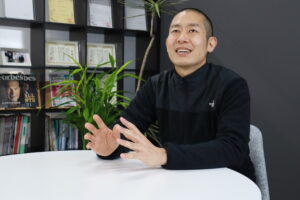
What have you learned from being more active in household chores?
First of all, I take the stance that my wife’s rule is law.
I hold a no-rebellion approach now. (laughs)
When I return the dishes from the dishwasher to the cupboard, I make sure to put them in the right places. I also follow my wife’s way of folding the laundry.
Another thing I pay attention to when doing laundry is sorting out what to put in the laundry net and what not to put in. That is, to evade all risks, I just put all of my wife’s clothes in the net. Everyone else’s clothes go straight in the machine.
Also, when I cook rice in the morning, my wife has a habit of opening the rice cooker to check the water levels. I really wish she’d trust my water-level knowledge, but I’m careful not to say so out loud. (laughs)
And, even though she adds extra water to her bowl of miso soup, I don’t say anything to stop her. I like a strong miso flavor, but that doesn’t mean she has to.
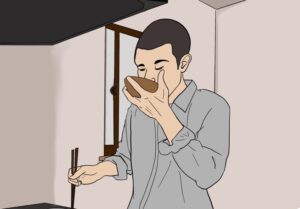
It’s definitely important to know when to hold back. (laughs) Many young doctors will also be starting families at this time of their lives. Do you have any advice for them?
Well, I haven’t exactly perfected the work-life balance thing. I’m not sure I can give the best advice; it’s a constant work in process.
That said, I do think every doctor needs to just set some time aside to dive into their work 100%.
I guess if it were me, I would set that time of full work devotion aside in its own place. At other times, I would do my best to take care of my housework and childcare.
Many doctors work very hard. There are definitely times at which they can’t survive without the support of their family and peers.
My wife is a full-time housewife, so she really helps me out. I think it’s difficult though if you and your partner are both working together in the same hospital, though, or even in the same medical profession. Therefore, I think it is a must for new fathers in particular to be able to do a full range of housework.
When it comes to housework, I think men in particular tend to draw a firm line. They think, “This chore is mine, but the rest isn’t my responsibility.”
Instead of only focusing on the narrow perspective of your own responsibilities, try improving and expanding by saying, “How far can I go on my own?” This will also lead to an improvement in surgery and your work skills.
That said, unless supervisors and other experienced doctors take the initiative in balancing work and family life, it will be harder for the younger generation to achieve a good work-life balance.
There are no surgeons with children in my immediate pediatric surgery team yet, but I think there will be in the future. I think there will be situations in which you as a young parent can’t get support from parents or your partner, but your child still needs you.
In that case, I would like to establish a system that offers the young doctor a nurturing, secure space in the hospital where their child can be looked after during work hours. That way, they’ll be able to go and check on their child when the need suddenly arises, without worrying about the impact on their work life.
To be honest, it’s a secret hope of mine to open a “Yamane Nursery” in the hospital someday.
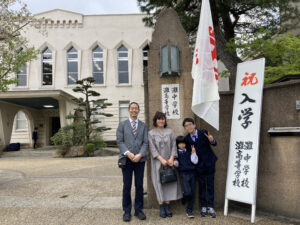
We saw on Facebook that Nagasaki University Hospital is prioritizing the creation of a safe environment for paternity leave applications.
I see! Now that you mention it, I heard recently that one of my colleagues was able to take paternity leave.
Recently, there have been a growing number of companies being more open about their growing paternity and maternity leave rates. Maybe that era has come for the medical industry as well.
I really do think so. Maybe doctors who are taking paternity leave could even do some PR from our official Facebook, like posting meals they cooked during their leave. I think this would help our recruitment process as well.
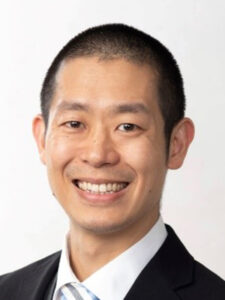
Dr. Yusuke Yamane
Affiliations:
Department of Oncology, Nagasaki University Hospital
Head of Pediatric Surgery Team, Nagasaki University
Dr. Yamane graduated from Nagasaki University School of Medicine in 2005. He joined the Department of Oncology in Nagasaki University Hospital in 2007 and worked at Oita Prefectural Hospital. Afterward, he entered Sasebo General Medical Center, then joined the Department of Pediatric Surgery at National Center for Child Health and Development in 2009. He returned to Sasebo General Medical Center in 2011 and to Nagasaki University Hospital in 2013. His hobbies include Shogi (Japanese chess), horse racing, surgery, and surgical education.